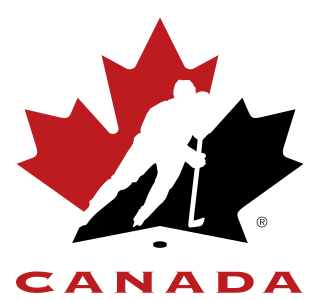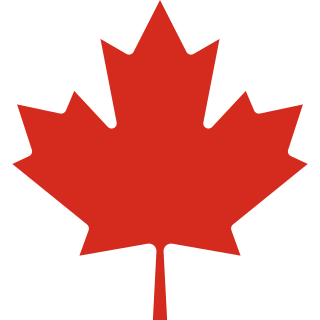
Hockey Canada is the national governing body of ice hockey and ice sledge hockey in Canada. It is a member of the International Ice Hockey Federation and controls the majority of organized ice hockey in Canada. There are some notable exceptions, such as the Canadian Hockey League, U Sports, and Canada's professional hockey clubs; the former two are partnered with Hockey Canada but are not member organizations. Hockey Canada is based in Calgary, with a secondary office in Ottawa and regional centres in Toronto, Winnipeg and Montreal.

The Canada men's national ice hockey team is the ice hockey team representing Canada internationally. The team is overseen by Hockey Canada, a member of the International Ice Hockey Federation. From 1920 until 1963, Canada's international representation was by senior amateur club teams. Canada's national men's team was founded in 1963 by Father David Bauer as a part of the Canadian Amateur Hockey Association, playing out of the University of British Columbia. The nickname "Team Canada" was first used for the 1972 Summit Series and has been frequently used to refer to both the Canadian national men's and women's teams ever since.
The men's ice hockey tournament at the 1948 Winter Olympics in St. Moritz, Switzerland, was the sixth Olympic Championship, also served as the 15th World Championships and the 26th European Championships. Canada won its fifth Olympic gold medal and 12th World Championship, represented by the Ottawa RCAF Flyers team of Canadian Armed Forces personnel. The highest-finishing European team Czechoslovakia, won the silver medal and its eighth European Championship. Bibi Torriani played for Switzerland which won the bronze medal, and became the first ice hockey player to recite the Olympic Oath on behalf of all athletes.

The United States men's national ice hockey team is based in Colorado Springs, Colorado, with its U18 and U17 development program in Plymouth, Michigan. The team is controlled by USA Hockey, the governing body for organized ice hockey in the United States. The U.S. team is currently ranked 4th in the IIHF World Rankings.
The men's ice hockey tournament at the 1960 Winter Olympics in Squaw Valley, United States, was the ninth Olympic Championship, also serving as the 27th World Championships and the 38th European Championships. The United States won its first Olympic gold medal and second World Championship. Canada, represented for the second time by the Kitchener-Waterloo Dutchmen, won the silver and Canada's ninth consecutive Olympic ice hockey medal. The Soviet Union won the bronze medal and its sixth European Championship. The tournament was held at the Blyth Arena, under the supervision of George Dudley on behalf of the International Ice Hockey Federation.

The men's ice hockey tournament at the 1956 Winter Olympics in Cortina d'Ampezzo, Italy, was the eighth Olympic Championship, also serving as the 23rd World Championships and the 34th European Championships. The tournament was held at the Olympic Ice Stadium and the Apollonio Stadium.

The Triple Gold Club is the group of ice hockey players and coaches who have won an Olympic Games gold medal, a World Championship gold medal, and the Stanley Cup, the championship trophy of the National Hockey League (NHL). The International Ice Hockey Federation (IIHF) considers them to be "the three most important championships available to the sport".
David William Christian is an American former professional ice hockey forward. He played on the 1980 U.S. Olympic hockey team that won the gold medal during the 1980 Winter Olympics. Additionally he played for five National Hockey League teams over a 15-season career.

The Canadian Amateur Hockey Association was the national governing body of amateur ice hockey in Canada from 1914 until 1994, when it merged with Hockey Canada. Its jurisdiction included senior ice hockey leagues and the Allan Cup, junior ice hockey leagues and the Memorial Cup, amateur minor ice hockey leagues in Canada, and choosing the representative of the Canada men's national ice hockey team.

The Minnesota Golden Gophers men's ice hockey team is the college ice hockey team at the Twin Cities campus of the University of Minnesota. They are members of the Big Ten Conference and compete in National Collegiate Athletic Association (NCAA) Division I ice hockey. The Golden Gophers have won five NCAA national championships, in 1974, 1976, 1979, 2002 and 2003. The team also shared the 1929 National Intercollegiate Athletic Association championship with Yale. and captured the national Amateur Athletic Union (AAU) championship for amateur hockey in 1940. The Gophers are currently coached by Bob Motzko. Under Don Lucia the Gophers earned a spot in the NCAA tournament in eight seasons during a nine-year time span, including five number 1 seeds and three appearances in the Frozen Four. The team's main rivalries are with the University of Wisconsin and the University of North Dakota, although several other schools claim Minnesota as their archrival. For much of the team's history, there has been a strong emphasis on recruiting native Minnesotan high school and junior hockey players, as opposed to out-of-state, Canadian, or European players. This helped high school ice hockey grow in Minnesota, particularly starting with Hall of Famer John Mariucci, who refused to recruit players from Canada. Minnesota high school ice hockey programs grew from 26 in 1945 to over 150 in 1980. Head coach Doug Woog championed home-grown talent even more, only recruiting Minnesota players in the late 1980s and 1990s, but recent rosters have been more diversified.

John Barry MacKenzie is a Canadian retired ice hockey player. He played for Canada at the 1964 and 1968 Winter Olympics, winning one bronze medal in 1968, as well as in three World Championships, winning a further two more bronzes. He would also play 6 games in the National Hockey League with the Minnesota North Stars during the 1968–69 season.

Robert Malcomson McKenzie is a Canadian hockey commentator who has covered hockey since joining TSN in 1986. As a TSN Hockey Insider and TSN's Draft Expert, McKenzie provides analysis for NHL on TSN telecasts, as well as for the IIHF World Junior Championships, NHL Draft, NHL Trade Deadline, Free Agency, and for six Olympic Winter Games.
The Winnipeg Hockey Club were a former amateur senior-level men's amateur ice hockey team in Winnipeg, Manitoba founded in 1890. After the Winnipegs won the 1931 Allan Cup, they represented the Canada men's national ice hockey team at the 1932 Winter Olympics held at Lake Placid, New York. The team was undefeated throughout the Olympic tournament and were named the 1932 Olympic and world champions.

The Berlin Dutchmen were an early professional ice hockey team operating out of Berlin, Ontario, from 1907 in the Ontario Professional Hockey League (OPHL). The Berlin team is notable for challenging for the Stanley Cup in 1910 versus the Montreal Wanderers. The dormant team was revived in 1926 as the Kitchener Dutchmen of the Canadian Professional Hockey League. The dormant name was revived in 1947 as the senior Kitchener-Waterloo Dutchmen, notable for winning Canada a bronze medal at the 1956 Olympics and a silver medal at the 1960 Olympics. The minor junior Kitchener Dutchmen continue the name today.
The 1967–68 Canada men's national ice hockey team represented Canada and won the bronze medal at the 1968 Winter Olympics held in Grenoble, France. This tournament also counted as the IIHF World Championships and the IIHF European Championships. The matches were played at the Palais des Sports.
Stephen Donald Rope was a Canadian ice hockey player who competed in the 1956 Winter Olympics and 1960 Winter Olympics.
William Norman Colvin was a Canadian ice hockey player who competed in the 1956 Winter Olympics.

Andrei Vasilyevich Starovoytov was a Soviet ice hockey administrator, referee and player. He won three Soviet ice hockey championships as a player, and was later an ice hockey referee at eight World Championships. He was the general secretary of the Soviet Union Ice Hockey Federation for 17 years, and negotiated Soviet participation in the Summit Series. He was posthumously inducted into the IIHF Hall of Fame.










